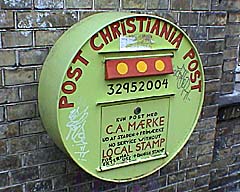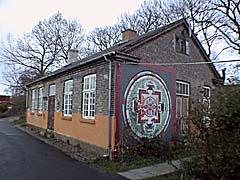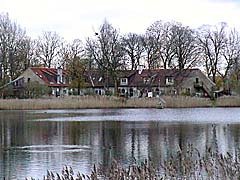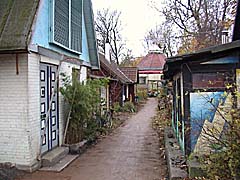
Week 7, part 8
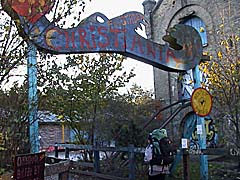 RoZ carries her load through the gates of Christiania.
A Christiania mailbox. "No service without local stamp. For external use + Danish stamp." 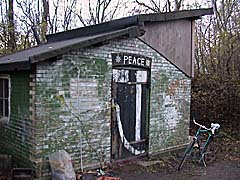
Two of the original military buildings after having been enhanced by the citizens of Christiania.
|
As our train was approaching Copenhagen, we observed that we were a bit stressed out because we'd spent so much of the previous week in big cities, and that some time in the quiet countryside would do us well. It didn't take long to realize that Christiania was what we were looking for, an enclave of quiet countryside within the city. As the Friday afternoon darkness set in, we took a leisurely walk around the central part of Christiania. This place started as an abandoned military depot that was built in the mid-19th century and squatted by hippies in the early 70's. Over the years, the old brown brick barracks and stockades have been creatively fixed up and remodelled, and many more innovative structures have been built to provide more space for homes and businesses. Meanwhile, political battles developed over the fate of this enclave which has millions of sympathizers all over Europe and the rest of the world. Eventually, Christiania attained legal status as an autonomous district of Copenhagen, and this grand social experiment has continued ever since. There remain many Christianians who would like this to be an independent country (kind of like the Vatican?). In fact, they have their own flag and postage stamp. We quickly came upon Pusher Street, which is Christiania's biggest tourist attraction, for better or for worse (more on that later). This area looks like a little flea market, except that all of the stands sell the same thing: cannabis and cannabis derivatives. We were amazed at how even though the dealers were sort of legitimate here, they still looked like the same seedy characters that dealers are everywhere. Even though there were dozens of booths, it made no difference which one a person would go to, as each one had the same product for the same price. It almost felt like there was a price fixing cartel in place, and there probably was. Cannabis and psychedelic mushrooms are the only drugs tolerated in Christiania; cocaine, opiates and other "hard drugs" are not. The harder drugs caused a great deal of problems in the early history of Christiania, so the community drew a very firm line. A citizen who is suspected of using hard drugs has two choices: submit to a urine test or leave Christiania. If the urine test is positive, there are two choices again: leave Christiania or get treatment. The treatment option is very generous and compassionate. The user can enroll into whatever treatment program (s)he chooses at the community's expense, and the enrollment is done in a way that it does not go onto the person's record. The person must live outside of Christiania while the treatment is in progress. After six months, if the user has remained clean for the entire six months, (s)he is welcomed back into Christiania. We saw none of the problems associated with hard drugs while we were there, so the rest of the world could learn a few lessons from Christiania's drug policy. As we continued walking about town we met Ivan, an ex-pat from DC who'd been living in Christiania for a number of years. "This was the right place at the right time for something like this to happen," was something he said early in our conversation. He rightly pointed out that if someone tried to squat an abandoned American military base they'd be quickly evicted by tear gas, dogs, and unspeakable violence.
|
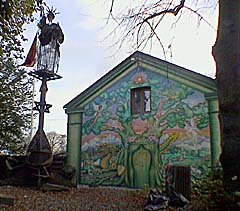 The original entrance to Christiania is now closed and serves as a display to the rest of the world.
A crown of nuclear missles and a handful of chains illustrate how many Europeans view the concept of American liberty.
This old bunker is now home to several Christiania families.
A neighborhood of Christiania, which is very walkable as a car-free city.
|
Next page ... Previous page
week 7 index
purplearth 2001 europe oddyzee index
purplearth home
